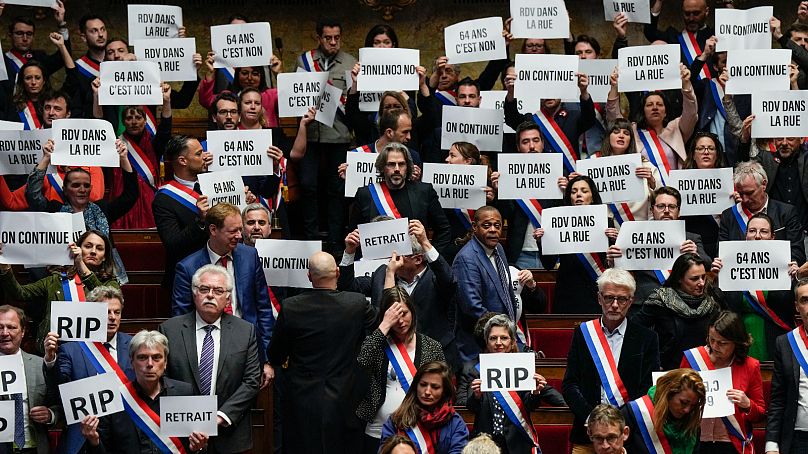Euronews spoke to constitutional experts about whether a sixth republic is on the horizon.
It’s been nearly three weeks since French President Emmanuel Macron had his government force a highly contentious pension reform package through parliament, bypassing a vote with a constitutional loophole.
 ADVERTISEMENT
ADVERTISEMENT
 ADVERTISEMENT
ADVERTISEMENT
The move sparked further protests, with demonstrations taking on a more violent character than before.
But could these protests against Macron's pension law and his use of the constitution usher in a dramatic change to France’s fifth republic? Not so fast, argue constitutional experts.
‘A political crisis more than a regime crisis’
For Thibaud Mulier, a lecturer in public law at the University of Paris Nanterre, today’s pension protests are more than just a political crisis but not yet a larger constitutional one.
"I think for the moment the Fifth Republic will survive this shock…though it could become more widely an institutional crisis," the constitutional expert said.
That’s because one of the key elements that led to more violent rioting was Macron’s use of article 49.3 of the constitution which allowed the government to force the reform through parliament without a vote.
The article is both legal and has been widely used, but was also subject to a 2008 constitutional reform of France's institutions that limited its use to budgetary laws, social security financing or one other law proposal in the same parliamentary session.
It also allows MPs to trigger a no-confidence vote after the article's use, which opposition lawmakers did, falling just nine votes short of passing in the National Assembly or lower house of parliament.
For protesters who have referred to Macron as acting like a “king”, the article is one example of how the fifth republic allows for a powerful president to override a defiant parliament.
It’s not a new critique of French institutions.
France’s Fifth Republic, founded in part by General Charles de Gaulle in 1958 after an uprising in Algeria, has long faced criticism about the role of the executive who has control over the government, parliament and constitutional council.
Subsequent changes to the republic have even increased the president’s clout.
A 1962 referendum had the president elected by popular vote, and a 2000 referendum resulted in an alignment of the presidential and parliamentary election calendars – something that has almost always resulted in an absolute majority for the president.
But Macron lost an absolute majority in the parliament directly following his reelection last year, a first since 1988 in France, which Mulier says means the president should in theory be negotiating more with the opposition.
"We have a government and a president who acts as if he had an absolute majority and that he can continue a 'presidentialist' practice to implement his programme with a relatively docile majority in the (parliament) but that’s not the case," he said.
Far-left opposition MP Matthias Tavel told Euronews it’s as if France has just discovered that Macron lost his absolute majority in the elections.
"We are perhaps the only democratic country, the only country in Europe, in any case, where a president of the republic, a government, can impose a law without a vote of the National Assembly," he added.
Historically, whenever the French government has attempted to reform the retirement system, it has provoked mass protests, with demonstrations forcing Prime Minister Alain Juppé to back down from his reform in 1995.
And while the protests are still focused against raising the retirement age from 62 to 64, Carolina Cerda-Guzman, a lecturer in public law at the University of Bordeaux, says that now the issue is also a question of what the presidential election represents and what mandate it gives to the president.
Could the current pension crisis lead to a sixth republic?
France’s Fifth Republic is its second-longest-running after the third which lasted 70 years and ended in 1940 amid the Second World War.
Leftist party La France Insoumise (France unbowed) had included a proposal for a sixth republic in their platform under leader Jean-Luc Mélenchon, who came third in the first round of last year's presidential race.
Tavel, an MP from that party, told Euronews that he expects their proposal will also be part of the larger left-wing coalition’s discussions this month, adding that in his view the French government is a "democratic anomaly".
But while the current crisis is a “good vector for speaking about” a new republic, it’s not being called for by voters, according to Mulier. Plus, in his view, a large institutional reform like the one carried out in 2008 would legally be difficult to achieve, and there is little "political will" for it.
MP Olga Givernet from Macron’s Renaissance party argued in a statement emailed to the press last month that the Fifth Republic has led France to greater stability and is not a "democratic aberration".
She said that while the use of article 49.3 was not pretty, "it leaves a chance of healing" while still "showing its limits".
"It is considered a denial of democracy, even though a majority of parliamentarians are in favour of the pension reform. This is the irony of a system where the minority claims without being questioned that it is the majority," she argued.
Cerda-Guzman points out there does exist something of a "betrayal" in the Fifth Republic since on paper the constitution is balanced, but in practice, it’s "completely different and allows the president to take control of all national politics."
"It’s the president who decided to trigger article 49.3 while it’s not up to him to do so. It is supposed to be the prime minister," she said.
Plus, there are few "exit doors" by which citizens can impose a decision on the president and those that exist remain in the hands of the president such as a referendum or a dissolution of parliament, Cerda-Guzman added.
But while she said that the conditions are likely not there to bring about a sixth republic in France, the current crisis could lead to other institutional changes.
Indeed, Macron already tried to amend the constitution during his first term, with a plan to add proportional voting to the parliamentary elections and to reduce the number of MPs.
He tried again after the "Yellow Vests" protest, with a reform that would have made it easier for the parliament and citizens to launch a shared referendum, but the law didn't come to fruition.
Last month, communist MP Stéphane Peu tabled a proposal to put the pension reform plan to such a referendum, with 252 MPs signing in favour. That proposal is currently being examined by France’s constitutional council.
For now, it’s a waiting game to see what the council decides on the retirement reform proposal and the referendum as more protests are planned.
“Maybe this crisis is an opportunity to debate the dysfunctions of the Fifth Republic. We will need to do it politically, but that means it must come from the (presidential) majority as well as the opposition,” Mulier said.













